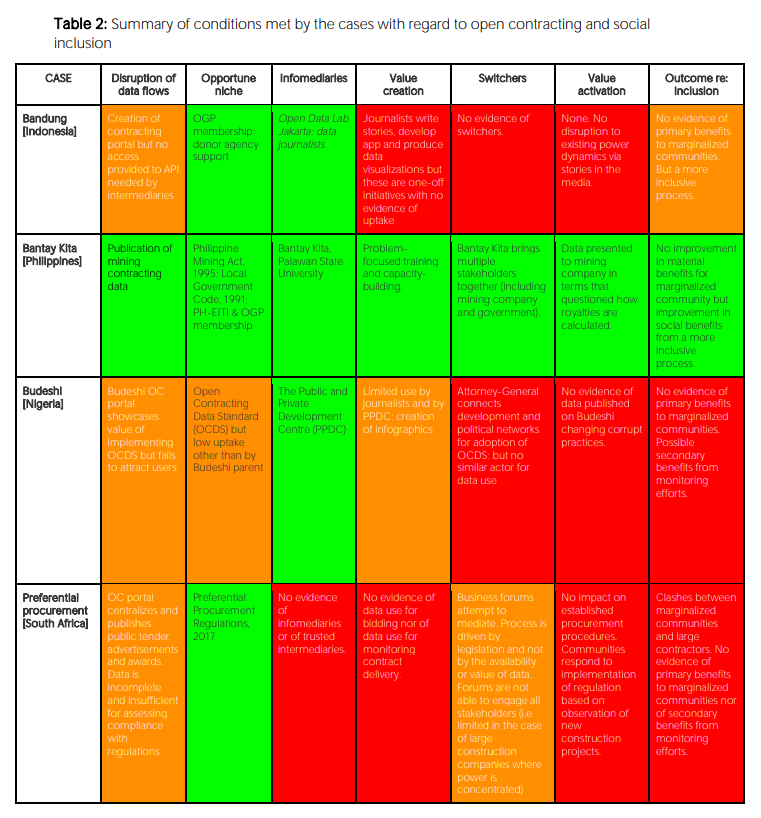[Summary: Exploring inclusion impacts of data and standards in response to a paper on Open Contracting & inclusion]
Yesterday I had the pleasure of joining a call hosted by HIVOS, and chaired by ILDA’s Ana Sofia Ruiz, to discuss a recent paper from Michael Canares and François van Schalkwyk on “Open Contracting and Inclusion”. The paper is well worth a read, and includes a review of five cases against a theoretical framework looking across data flows, opportunities for action, infomediary presence, and through to inclusion outcomes (see table below for example of how these play out in a few of the cases reviewed)

After the discussion, we were asked to summarise some of our inputs – hopefully feeding into a wide write-up. However, in case what I’ve written up doesn’t really fit the format of that, I’m posting a cleaned up and slightly expanded version of the remarks I made below:
This paper, and the discussion around it, raises a number of valuable questions – drawing on a rich theoretical landscape to post them.
Firstly, it asks us “How are data flows being disrupted?”. This question is important, because in many ‘open contracting’ projects it is rarely explicitly asked. We’re living in a time of mass disruption, yet open contracting is often ‘sold’ as a kind of reform. One of the widely used success stories for work on open contracting data comes from Ukraine, where there was a true disruption in data flows – using the moment of revolution to reconfigure patterns of procurement, and to create data infrastructures that enabled those new more open practices.
Secondly, this paper calls on us to question “what is the value of data in bringing about inclusion?” In the past we’ve talked about whether open data is either necessary or sufficient to create change. The answer I take from this paper is that increased accessibility of information and data is ‘a very useful, but nowhere near sufficient’ condition for inclusive change.
Thirdly, the use of Castell’s framework from Communication Power of ‘network power’ (shaping the information that can be transmitted), ‘networking power’ (gatekeeping which information is transmitted), and ‘networked power’ (control by one node in the network of others), and ideas of ‘programming the network’ and ‘reprogramming the network’, raise some critical questions about the role of data standards. Often treated as neutral artefacts, standards are in fact sites of power, and of the negotiation of network and networking power. A standard defines what can be expressed, and its implementation involves choosing what will be expressed. Standards can be at once tools that cross contexts, taking with them the potential of inclusion and exclusion (network power), and at the same time, have that potential left inert if the localised networking power decides not to take up inclusion oriented features.
To put this more concretely (if still a little complex I fear), the Open Contracting Data Standard was explicitly designed with a technical architecture that permits data about any given contracting process to be published by any actor, not only the ‘official’ information provider, and with a mechanism for extensions, supporting new fields of data to be attached to a contracting process. The ‘protocol’ sought to be inclusive. However, in practice, most tools have not been built to exploit this feature – meaning that in practice, the ‘platforms’ that exist don’t support inclusion of alternative perspectives on the state of a contracting process. This highlights that even at the level of the technical infrastructures, these are not made once, but have to be constantly remade, and their inclusive potential reinforced.
Fourth, the paper calls for a renewed focus on both governance context, and on intermediaries. Whilst technical artefacts can cross contexts, intermediary capacity building needs significant investment setting-by-setting. Equally, the discussion brought into view that this cannot be a short-term process. Intermediaries need not only skills, but also stocks of trust, in order to broker connections and communication. One of the evaluation team who had worked on a case covered by the paper discussed how it was individuals’ ability to maintain trusted relationships across different stakeholder groups that was critical to connecting information and empowerment. The importance of this cannot be overstated.
Fifth, and finally, in his opening statement, Michael Canares challenged us to consider whether Open Contracting is different from other public sector reforms? After all – there have been decades of procurement reform. To this, I’m prepared to advance an answer: There is a meaningful qualitative difference with government reforms that start from the premise of openness. When a commitment to being open by default is put into practice, the configuration of actors involved in creating change is different, and conventional patterns of bureaucratic reform can be disrupted. Whether they are disrupted or not depends still on individual internal and external actors, and on whether the culture, as well as the practice, of openness has been brought into play. Nevertheless, Open Contracting has certain potential that is simply absent from past procurement reforms – and that is something to continue to build on.
The challenge ahead now is to work out what to do with these questions. We’re starting to unpack the complexity of open contracting practice – and the nuances for each individual setting. But, if all we have are critical questions, we risk inaction rather than advances in inclusion. During the early development of the Open Contracting Data Standard we often turned to the mantra that we should not let the perfect be the enemy of the good. This carries forward: as we avoid the perfect being the enemy of making things better. I’d contend that we need to continue turning our learning into tooling – whether technical tools, evaluation frameworks, to simple planning tools for new initiatives. Only then can we be part of taking on the large scale reforms that this time of disruption needs.